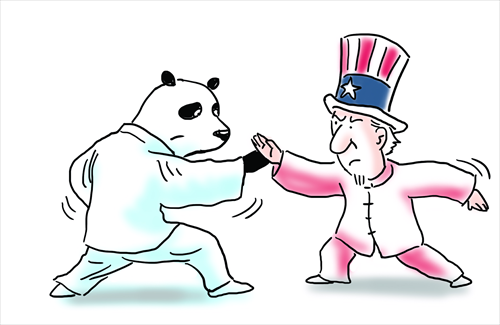HOME >> OP-ED
Washington needs to fit rhetoric to action
By Sun Chenghao Source:Global Times Published: 2016/8/2 19:13:39 Last Updated: 2016/8/2 20:17:34

Illustration: Liu Rui/GT
Last week, Susan Rice concluded her fourth visit to China as US President Barack Obama's national security advisor, which aimed to emphasize that, as she wrote in the official blog of the Department of State, there is no more consequential bilateral relationship than the US-China relationship.
The timing is critical. The visit is just two weeks after the announcement of the South China Sea arbitration result and a month before the G20 Summit in September. If we take a slightly long-term perspective, there is only half a year left for Obama to deal with China as the US president. For Rice, two tasks might overwhelm the others during the trip: one is to prepare for the meeting between leaders of the two countries during the G20 summit and the other is to compare notes on the issue of the South China Sea.
In her article, Rice listed numerous cooperative ventures achieved between the two countries in the past years. But she also implied her concerns about South China Sea by saying that the US "overriding interest is the peaceful resolution of conflicts and sustaining the rules-based international order."
The South China Sea issue has become a thorny problem between China and the US in recent years, although it should have not been. In 2010, then secretary of state Hillary Clinton's speech in Vietnam signaled that the US' South China Sea policy has undergone an essential change from "observation" to "intervention."
The US intervention in the South China Sea has clearly contributed to the increasingly intensifying situation, leading some Southeast Asian countries to believe that they can resort to the US to protect the islands they illegally seized. The Philippines and other US allies in particular, believe the aim of Obama's rebalance to the Asia-Pacific strategy is to balance China and the South China Sea issue will become one of the focuses of US China policy.
The arbitration in July was expected to further complicate the situation at first because it set a wrong example and increased distrust between China and the Philippines, and could even affect other ASEAN countries. Fortunately, after the meeting between Chinese Foreign Minister Wang Yi and his counterparts from 10 ASEAN members, a joint statement was released to promote peace, stability in the South China Sea, putting the issue on the right track.
And now is the time for US to show its sincerity for cooperation if it truly treasures China-US relations as Rice argued. Since the two countries made breakthroughs on climate change in 2014 and cyber security in 2015 while still missing one major breakthrough in this year, the South China Sea issue might be a good option.
Before that, the US should drop its groundless criticism on China's "militarization" in the region first. The word "militarization" lacks clarity because it was raised by the US without a clear definition. If taking US military bases in Japan and South Korea as the standard, the islands in the South China Sea are far from being militarized. Or if we take stationing defensive weapons and building runways as standard, the South China Sea had been militarized long before China's recent constructions. Similarly, under the blurring concept, US warships and military aircrafts entering South China Sea are well qualified of being militarizing the region.
Second, the US should change its attitudes toward freedom of navigation operations. From the Chinese understanding, freedom of navigation has never been a problem. However, what the US is actually seeking is freedom of action in conducting such operations. What the US wants to ensure is that even if its entrance into the region is not based on law, China has no way to stop it.
China-US relations should not be defined by the South China Sea issue. The US should show its political will and offer some momentum for the start of China-US cooperation to maintain a stable region. Before leaving the White House, Obama should bear in mind that, without a successful China policy, the Asia-Pacific rebalance strategy would go nowhere.
The author is an assistant research fellow with Institute of American Studies at China Institutes of Contemporary International Relations. opinion@globaltimes.com.cn
Posted in: Viewpoint